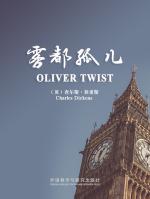Comment
Oliver Twist is a novel written by Dickens, who wanted to reveal the social problems in England in the 19th century, for example, the workhouse, child labor, gang using kids to steal and so on.
The book is about the living at the bottom class of society. From the title we can find that it seems to be a biography for someone, it is the name of the protagonist, the poor little orphan Oliver. Oliver’s mother died just after he was born, he was brought up by a malevolent old woman until 9, and then the beadle took him to the workhouse for labor work. Oliver hadn’t get better treat in the workhouse, later he was sold to an undertaker, with his life just been improved, another apprentice bullied him that made him on his way. After a weeklong trek to London, the innocent little Oliver was seduced into a den of thieves. Fortunately, before he had ever picked up any bad habits, he came across a kind old man, though forced back to the den, his fighting awakened a woman thief’s conscience, which saved his life and future. The head thief was caught at the end, and Oliver finally got a happy life living with his adoptive father.
So impressed I am, I went to search the Internet and found several movies adopted from the book. Movies make the story more intuitive to people, I can recall the plot the moment I see a familiar scene in screen. Here are some scenes that I captured and had a deep impression on. First, at the very beginning, when Oliver was still suffering in the workhouse, he was chosen to ask for more gruel as the representative of all the children. But the man hit him, and the beadle exaggeratedly reported to board. When the door opened, we can see a table with all kind of delicacies on it. It’s the scene that being indicated in all the movie I’ve found. The board enjoyed their life without feeling guilty, comparing to those starving children who didn’t even deserve another cup of gruel, it implies the social phenomenon that the corrupt officials were living a rich life while the poor had to struggle for their basic need of survival.
Later then, Oliver was sold as an apprentice to the undertaker, Mr. Sowerberry. He was a person that I don’t hate for his role position. Concerning of Oliver’s experience before, I thought he was another mean and unkind employer. But it proves that I’m wrong. He found a job based on Oliver’s advantage, though it’s not such kind of “good” job. And when the other apprentice as well as the maid and the hostess set up Oliver, and when the Beadle asked Mr. Sowerberry to punish him, I can see the pain in Sowerberry’s eyes too. He appreciated Oliver’s personality, he was an obedient and honest child after all, and therefore he was unwilling but forced to hit him. From this it showed that the Sowerberry would be a kind tutor if there was no such other sourness that bullied Oliver away. I think maybe this character is a soft point of the author.
Another important character who contributed a lot to the happy ending is Nancy, a thief who was trained by Fagin since she was a little girl. The innocence and experiences of Oliver awakened Nancy’s conscience, hence she tried to save him from those criminals, prevented him from becoming a thief, a way one could never turn back. Lamentably, being informed of the betrayal of Nancy, the evildoer Sikes killed her in consequence. Reading this, I felt so sorry for her, nevertheless, it was her sacrifice that led to the siege in the end, bringing in the final victory.
The figures in the whole story are characteristic, lively, drawing a clear demarcation between whom or what to hate or love. In the book, Oliver and Nancy are on behalf of goodness. They were both born poor, suffering a lot and misled, growing up in the dark side. They had seen the ugliness and sins in this world, the innocence behind their mind never changed, though. Justice beats the evil at last, Nancy’s gone, but she had made something great and brave that she had never done before. And Oliver, reunited with his grandfather finally, regained his due inheritance. And the evil representatives like Fagin, Sikes, Monks and Bumble were all paid in the end.
Despite of the critics to the society, the author delivered a faith that justice will always defeat the evil. Though the ending of some characters were too coincidental and idealized, it makes a difference to educate people to do good stuffs and suppress the evil.



 京公网安备 11010802032529号
京公网安备 11010802032529号